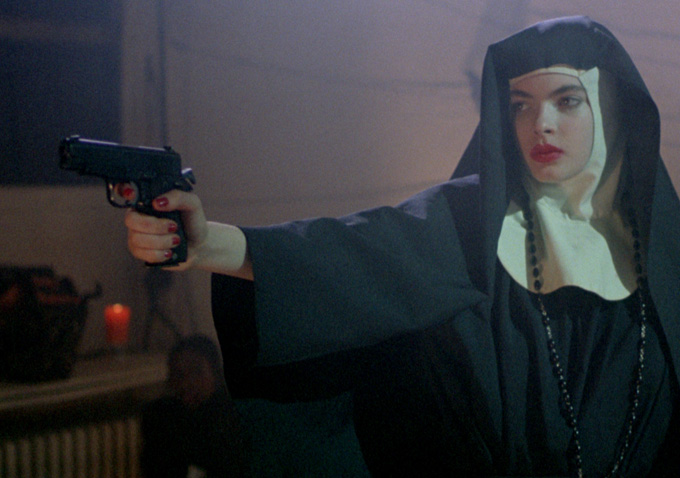
It doesn’t take long into “Ms. 45” to know that you’re inside an Abel Ferrara film. Four gunshots announce the title card of the movie, while within the first ten minutes, a young woman gets raped twice—once on the way home from work, pulled into an alley and violated by a masked man, and again in her apartment by a burglar who decides to take her body when she doesn’t have any cash. And by the way, she’s mute too. Certainly, the indicators are that the man whose previous efforts at the time were the driller killer movie titled, uh, “Driller Killer” and a porno, along with a handful of shorts, wasn’t exactly going to be pushing the creative envelope here. But, beneath the provocative opening and imagery is a picture with surprising restraint and a real sense of purpose.

And it’s rather remarkable how much Ferrara wrings out of what is a pretty thin premise in a script that doesn’t really have much in the way of plot. The wide-eyed, undeniably beautiful Zoë Lund leads the flick as Thana, a lonely, single young woman whose entire life seems to revolve around her garment sector job. Outside of work, her only interaction seems to be with the nosy neighbor downstairs, but her life understandably changes after she’s attacked, and winds up killing the second perpetrator in her apartment. It seems to trigger something inside of her, a feeling she can’t quite understand just yet. So long being used to catcalls on the street, a strange transformation takes place turning Thana from objectified prey into deadly predator. And pretty soon, she’s taking the titular weapon, nabbed from the assailant she killed, and heading out into the night taking her vengeance out on random men.
And that’s about it, but that framework allows Ferrara to have some fun playing with themes, even if they don’t coalesce into any kind of cohesive statement. In particular, while the approach of the low budget movie mostly embraces a leaning toward realism, the unapologetically fake looking blood and fairy tale visuals—a glass apple; Thana’s cape she wears later in the picture—suggests something that’s happening in a heightened space. Emotionally, Thana is clearly going through a trauma from two sexual assaults, with a reaction that is no doubt extreme (let’s just say her methods of disposing of the body in her apartment get creative).

Again, Ferrara uses this surreality to present some transgressive shots, particularly of Thana dressed up as a nun in the film’s final act at a Halloween party, and one climatic shot in which a knife clearly becomes a phallus. And when he’s not trying to jolt the audience, he’s taking a small swipe at his contemporaries. One sequence in particular mirrors Woody Allen’s iconic Queensboro Bridge shot from “Manhattan“—two characters in silhouette, with the bridge in the background, seemingly romantic—and quickly turns it upside down, and concludes the scene with a shocking bang. It’s playful stuff from a filmmaker who is still establishing his voice, but having a helluva time doing it.
Ultimately, “Ms. 45” is far more interesting and genuinely enjoyable (versus ironically enjoyable, as many of this vintage grindhouse flicks wind up being) than it has any right to be. Ferrara is mostly thoughtful throughout the movie, with a careful sense of pacing and a true respect for Thana, that again, this genre usually doesn’t take the trouble to do. Thus, it gives her quest, which eventually takes on a tragic dimension, real shape and stakes, even as the movie eventually sides with its thriller elements by the ending. And while Ferrara would become more provocative as the years went on, the closing shot of “Ms. 45” shows that at least back then, he was conscious of making sure audiences went home with a smile. [B-]


